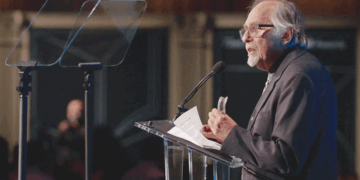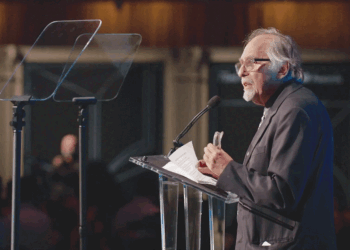Tina Liebling, a lawmaker from Rochester, is campaigning for governor on a Bernie Sanders-type populist platform
By MORDECAI SPECKTOR
Minnesota never has had a woman governor. And there’s never been a Jewish governor. If state Rep. Tina Liebling, DFL-Rochester, is elected governor next year, she will check off both boxes, so to speak.
The Minneapolis native declared her candidacy for governor in April. Her campaign website (tinaliebling.com) proclaims her intention: “I’m running for governor because Minnesota government must work in the interest of ordinary Minnesotans. I can’t be bullied or intimidated. I stand up to the special interests who take more and more, leaving too many Minnesotans struggling to get ahead.”

During a recent visit to the Jewish World offices, Liebling, 63, spent more than an hour elucidating her views about where she thinks Minnesota government must go. She also talked about her unconventional family background: her mother suffered from mental illness, and as a teenager, Liebling went to live with her father, the late Jerome Liebling, a renowned photographer who documented the people of Minnesota in the 1950s and 1960s.
Liebling traces the origins of the gubernatorial campaign to Sen. Bernie Sanders’ run for president. She supported Sanders, and introduced him at a 2016 rally in Rochester. After the remarkable Sanders campaign fell short, she ended up voting for Hillary Clinton on Nov. 8, 2016.
After the 2016 elections, “so many people felt we’ve got to do something more, there’s this rising activism. And I felt the same thing,” Liebling explains. “Of course, I’ve been in the House of Representatives, now I’m in my seventh term, and I felt that I’ve got to do something, also… We have to be sure that the state goes the right way, because it is absolutely a buffer against some of the terrible directions that the country is taking.”
She admits that her campaign for governor is in the mold of the Sanders presidential campaign.
“When I’m out giving my speeches, I say… it’s not because we’re both Jewish or I liked his hairstyle,” Liebling says, regarding the senator from Vermont. “It’s because I thought that he was really addressing the issues that mattered, and people were responding to that. He was talking about what was going on in the economy, and how hard it was for young people to get a real job, and how hard it is to go to school, and how hard it is to manage your life with all this debt, and how hard it is to retire.”
In addition to this ideological orientation, Liebling says, “We needed somebody who couldn’t be pushed around when they were in the office.”
Liebling looked around for a DFL candidate who filled the bill. “At a certain point I realized that we all have to be the leaders we’re looking for.” She had been speaking to women for years, urging them to run for office. “I said, I better listen to my own advice and just do it.”
Bernie partisans encouraged Liebling to run. After the 2016 elections, the Sanders campaign has morphed into the Our Revolution organization. Liebling points out that the group hasn’t endorsed candidates for statewide offices yet. As the only Bernie supporter among the cohort of DFLers running for governor, she hopes to get the Minnesota group’s endorsement.
In addition to the governor’s contest, Minnesota will have two races for U.S. Senate seats, following the resignation of Sen. Al Franken and Gov. Mark Dayton’s appointment of Lt. Gov. Tina Smith to complete his term. Incumbent Sen. Amy Klobuchar is up for reelection.
The first step of the DFL endorsement process occurs Feb. 6, when precinct caucuses take place. “On the DFL side, there will be a nonbinding preference poll, and that starts the process for selecting delegates that eventually get to the state convention, which is in Rochester this year,” she notes. The DFL state convention is set for June 1-3, at the newly remodeled Mayo Civic Center.”
In addition to Liebling, leading DFL candidates for governor include U.S. Rep. Tim Walz, Minnesota Auditor Rebecca Otto, state Rep. Erin Murphy, St. Paul Mayor Chris Coleman, and state Rep. Paul Thissen. Gov. Dayton will not be running for a third term.
Asked about her chances of winning, Liebling replies, “I’ve always thought that elections are about raising issues, and talking to people and listening to people, and offering something to people. But I think right now we’re in a political time when who knows what is viable? And that is part of why I decided to run, too: We saw the safe candidate, Hillary Clinton, who had a lot of money, and probably was the best-qualified [presidential] candidate in the history of our nation, and had a lot of strong things going for her… we saw that didn’t do it.”
Liebling says that a DFL candidate must win the race for governor, but the winning formula is somewhat of an unknown.
“We need to try to be speaking to people,” she suggests. “That’s what I think can win…. We need to be saying to people, We are with you. And if we are with them, then I believe they will be with us. But too often what happens, even with Democrats, is that we say we’re for the ordinary people, but then when we get in office, we’re doing things that are really for the millionaires and billionaires, or the people who have lots of lobbyists at the Capitol.”
A recent Pioneer Press profile of Liebling described her as a “policy wonk.” She says that she was surprised to read that, but allows that she does like to dig into issues. “I ask a lot of questions,” she comments. “I like to understand what I’m doing.”
On the issue of marijuana legalization, Liebling has been out front in the Legislature. Eight states have legalized marijuana for both recreational and medical uses. The federal government still classifies marijuana as a Schedule 1 drug, and bans both its use and sale.
Most of Liebling’s fellow DFL gubernatorial contenders have jumped aboard the legal weed train; and she remarks, “I think they followed me on that. I have very publicly come out in support of removing the prohibition on cannabis.”
She points out that cannabis possession already has been decriminalized in Minnesota. “Not everybody realizes that,” says Liebling, who has introduced legislation to legalize cannabis, with the full array of regulatory procedures.
Toward the end of the interview, Liebling raised two of the major issues she has championed: affordable health care and providing a living wage for working people.
“I’ve always been for single-payer health care,” she comments. While the Affordable Care Act (aka ObamaCare) was a step forward, “this is not the be-all and end-all, because it’s still based on insurance… I still think that the state needs to move toward a single-payer, Medicare-for-all type of system, and it would be enormously beneficial for the state.”
And regarding a livable wage, Liebling refers to the annual “Cost of Living Report” issued by the state Department of Employment and Economic Development (DEED), which finds that a $15 hourly wage — the goal of activists and elected officials over recent years — does not cover the basic needs for people living in the Twin Cities. Even with “no savings, no vacations, no eating out and no entertainment… fifteen dollars [per hour] in the metro area does not get you there today,” Liebling says.
“It’s not good enough to say, in five years we’ll get to $15 dollars an hour,” she adds. “We need to at least try offering people a vision of something that actually makes a difference now; because people are struggling, and more and more people in Minnesota are just not seeing a future.”
As mentioned previously, Liebling was raised in Minneapolis, where she attended University High School, then Marshall-U High through 10th grade. She then spent a year as an exchange student in Argentina; and during that time, her parents were divorced. Liebling went to live with her father, famed photographer Jerome Liebling, in Massachusetts.
Liebling, the second of five children in her family, says her mother had a “mental illness that was never diagnosed. She went through some really difficult times. It was kind of a fractured family; and back in those days, people didn’t talk about that much,” regarding her mother’s mental illness.
“I didn’t even realize until years later that that was what was going on,” she recalls. “that she in fact was mentally ill when I was growing up.”
Regarding her late father, a Brooklyn, N.Y., native, who used his camera to document the people of Minnesota in cities, small towns and on Indian reservations decades ago, Liebling mentions, “He used to take us with him on a lot of his trips. In my campaign I talk about it, because he was somebody who really was about the heroism of the ordinary person. You really see that in his photographs.”
She points out that both her father and mother, Phyllis (née Levine), also from Brooklyn, were Jews, “but they were sort of secular, social justice type of Jews, so we never went to a synagogue. We lived near Temple Israel [in Minneapolis]… I knew I was Jewish, but I didn’t know what that was.”
After graduating from high school in Massachusetts, Liebling returned to Minnesota to attend the University of Minnesota. She worked her way through the U of M with varied jobs — waitress, nurse’s aide at HCMC and shoe repair shop assistant — and graduated magna cum laude with a bachelor’s degree in Spanish.
She returned to Massachusetts and earned an M.S. degree in public health at the University of Massachusetts-Amherst. She went on to earn her J.D. from Boston University. During a summer internship in a large Chicago law firm, she met Mark Liebow. After Liebling graduated law school, they got married. Liebow is a physician at the Mayo Clinic. The couple have three grown children and one grandson.
The family belonged to B’nai Israel Synagogue, the Reform congregation in Rochester, where the children celebrated their B’nai Mitzva. Liebling says that she and her husband now attend High Holidays services at Shir Tikvah in Minneapolis.
“If I can, I would be at Saturday services every week,” says Liebling. “Since I’ve been campaigning, I’ve been able to do that less and less, because people schedule stuff on Saturday mornings without even a thought. And if I do get to be governor, if they want me to be there, it isn’t going to be Saturday morning, because I need to go to services on Saturday mornings.”
(American Jewish World, 12.29.17)


















